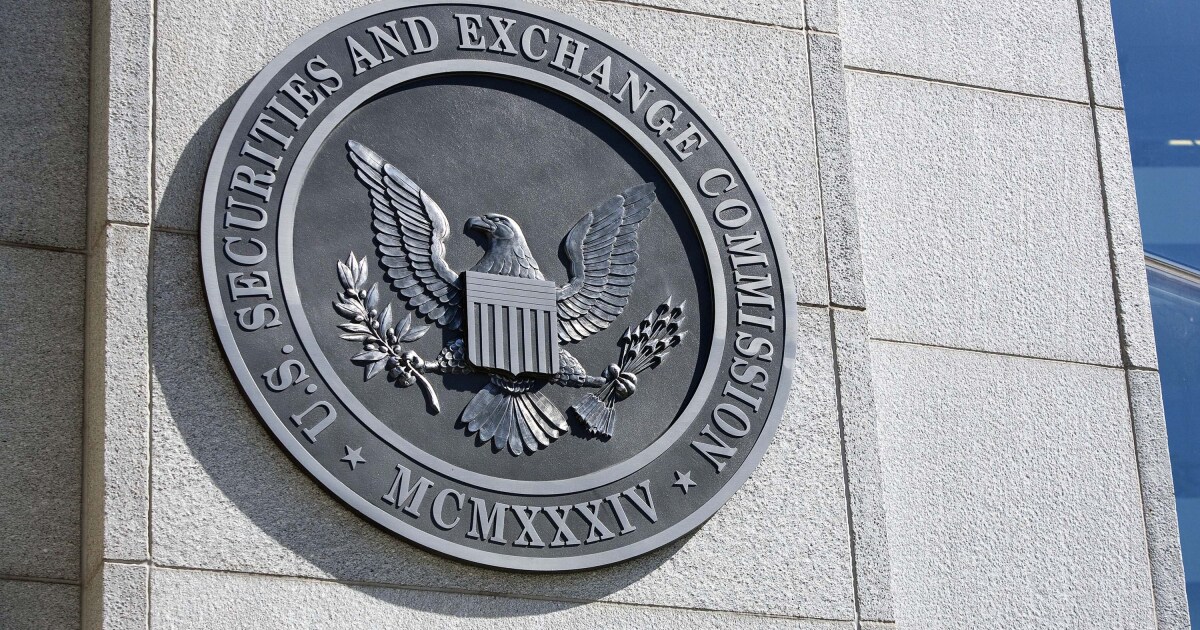Accounting
Wall Street seizes opportunity to gut SEC trading surveillance
Published
2 weeks agoon


After 14 years of debate, the Securities and Exchange Commission is in the final stages of bringing a powerful new surveillance tool fully online. But Wall Street is seizing on the ideal political environment for a last-ditch attempt to kill it.
The
Citadel Securities is leading a suit seeking to have the CAT declared illegal, and Wall Street is rallying behind it. Though financial firms have long expressed skepticism about the project, they are now allying with Republicans in Congress to paint it as a dystopian nightmare that would allow the federal government to spy on the investment decisions of every American. The fight also comes as the U.S. Supreme Court has hinted that it’s inclined to rein in the SEC and other federal agencies.
‘Orwellian surveillance’
Ken Griffin’s market-making firm declined to comment for this article but pointed to its
In a
The SEC called the challenge “meritless” in an April 15 court filing and said Citadel Securities had never objected to the CAT before it filed its challenge last fall.
The regulator defended the CAT as a natural progression of its oversight powers and said the previously “cumbersome, time-consuming and frequently unsuccessful” process of tracking orders had become obsolete in today’s faster and more automated markets. The agency also said there were limits on the CAT’s access to and use of personal data and decried the “caricature” of the database being used “to snoop on Americans’ personal financial decisions.”
Wall Street has a specific beef with how the SEC wants to pay for the CAT — by imposing billions of dollars in fees on broker-dealers. The database is actually owned by CAT LLC, which is composed of stock exchanges and the industry-backed Financial Industry Regulatory Authority. The current SEC plan is to allocate two-thirds of the costs of developing and operating CAT to broker-dealers as opposed to the exchanges and Finra.
But David Rosenfeld, a former SEC enforcement official now teaching law at Northern Illinois University, said there’s also clearly concern on Wall Street about enhancing the agency’s ability to examine trading activity.
“It gives the SEC not exactly real-time but close to real-time insight into what’s going on as far as trading is concerned,” said Rosenfeld. “That can give them a huge advantage in terms of ferreting out certain types of misconduct. There’s lot of things you can figure out just by looking at the data.”
One in a trillion
First proposed in the wake of the 2010 “flash crash,” the CAT’s data collection has proceeded in stages, starting with equity trades and non-complex options trades in 2020 and moving to complex options trades the following year. The May deadline is for market participants to submit client information to the CAT.
In December 2022, the SEC gave its first indication of how it would use CAT data for enforcement, quietly crediting the database with uncovering one of the biggest front-running schemes ever. Nuveen trader Lawrence Billimek was charged with tipping off Oregon retiree Alan Williams about stocks the asset-management giant was planning to buy, netting them $47 million in illegal profits.
Legal experts say the pair’s insider trading probably wouldn’t have been caught without the CAT.
Major insider-trading cases have often focused on single-market events like merger announcements. In the Nuveen case, the SEC used the CAT to track some 1,697 intraday equity trades made by Williams, finding he had a 97% “win rate” over a five-year period. The chances of that occurring randomly were less than one in a trillion, the SEC said.
Both men pleaded guilty to criminal charges last year, and Billimek is scheduled to be sentenced on May 20. He faces up to 20 years in prison.
“Before the CAT, it was literally like the SEC was in the horse-and-buggy era of the 19th century trying to catch the fastest race car drivers of the 21st century,” said Dennis Kelleher, co-founder of financial reform advocacy group Better Markets. “I mean, it just wasn’t a fair fight. This changes all of that.”
Supreme Court v. agencies
At an
“Stay tuned. More CAT in the future,” she said.
But that promise of stepped-up enforcement could be in jeopardy.
In November, the conservative
Citadel Securities filed its October suit in the federal appeals court in Atlanta, which is regarded as more conservative than its counterpart in Washington. The firm argues in its suit that a project as big and expensive as the CAT, with an estimated price tag of $1 billion to develop and then $200 million a year to maintain, can’t be pushed on the industry by the SEC without explicit congressional approval.
Congressional brief
David Slovick, a former SEC lawyer now at Barnes & Thornburg, said rulings on agency overreach by the Supreme Court could influence the judges in the CAT case.
“If there’s an avenue for a win here,” he said, “I think it’s the Supreme Court saying, ‘You’re acting outside of the scope of your regulatory authority and you need to go back to the congressional well and get legislative authority to do what you’re trying to do.'”
Citadel Securities’ arguments have already found a receptive audience on Capitol Hill. In February, Congressional Republicans led by Senator Tom Cotton of Arkansas and including Senator Tim Scott of South Carolina, filed a
‘Core values’
Republicans have expressed a particular fear that CAT data could be used to monitor investors’ political and religious beliefs.
“Economic transactions offer a window into a person’s deepest thoughts and core values,” SEC Commissioner Hester Peirce, an appointee of former President Donald Trump, wrote in a dissenting
“That some investors undoubtedly are engaged in misconduct in our financial markets cannot justify amassing this information,” she added. A conservative think tank last month filed a
But Slovick says the concerns about investor privacy are overblown, since the data was already being collected by the exchanges and Finra. In his view, the finance industry is harnessing the political argument to cloak its true reason for opposing the CAT.
“It makes the SEC’s lift a lot lighter,” said Slovick. “Their cases against Wall Street are going to be more effective and, of course, Wall Street doesn’t like that.”
You may like
Accounting
EV makers win 2-year extension to qualify for tax credits
Published
2 weeks agoon
May 4, 2024

The Biden administration gave carmakers a partial reprieve in finalizing electric-vehicle tax credit rules intended to loosen China’s grip on battery materials crucial to the car industry’s future.
Starting in 2025, plug-in cars containing critical minerals from businesses controlled by U.S. geopolitical foes, including China, will be ineligible for up to $7,500 tax credits, the Treasury Department said Friday. Automakers will get an extra two years, however, to shore up sourcing of graphite and other materials considered difficult to trace to their origin.
The rules put finishing touches on President Joe Biden’s push to develop an alternative to China’s preeminent EV and battery supply chains. The administration is imposing stringent sourcing requirements for raw materials and components in order for electric cars to qualify for the tax credits that are a powerful draw for consumers otherwise put off by
“These actions provide a strong signal to automakers that we want to see EVs built here in America with components and critical minerals sourced from the U.S. and our allies and partners,” White House Climate adviser John Podesta said.
The two-year exemption speaks to the challenges automakers have had reducing their reliance on Chinese suppliers of materials such as
The Biden administration’s rules don’t allow tax breaks for vehicles with batteries containing critical minerals from foreign entities of concern, a term referring to businesses controlled by US geopolitical foes such as China, North Korea, Russia and Iran. Those requirements take effect in 2025, as proposed.
But Biden has given auto and battery manufacturers some flexibility on this front, too.
Automakers will now have until 2027 to curb the use of certain difficult-to-trace materials from FEOCs, provided that they submit plans to comply after the two-year transition and it’s approved by the government, the Treasury Department said.
“FEOC exemptions for any battery materials should be temporary,” said Abigail Hunter, the executive director of the Center for Critical Minerals Strategy at SAFE, a Washington think tank. “We need a clear exit strategy, lest we continue our dependencies on adversaries and further undermine the competitiveness of U.S. and allied critical minerals projects.”
The rules release concludes two years of work on requirements that already have reduced the number of EVs eligible for tax credits. About 20 models qualify today, compared to as many as 70 previously. Treasury Department officials said Friday they expect the number of qualifying vehicles to continue to fluctuate as companies adjust their supply chains.
Automakers including Tesla Inc., General Motors Co. and Toyota Motor Corp. have lobbied for additional flexibility to meet requirements. A lobby group representing automakers based outside the US praised the additional two years provided for the difficult-to-trace materials.
“It will take time for the global production and sourcing of graphite and other critical minerals needed to produce EVs to match the strict standards required by automakers,” Autos Drive America President Jennifer Safavian said in a statement.
Accounting
Oregon senator Ron Wyden demands refunds for TurboTax customers over glitch
Published
2 weeks agoon
May 4, 2024
Senate Finance Committee Chairman Ron Wyden, D-Oregon, demanded
The glitch,
“Fixing this error will require identifying all affected Oregonians, notifying them, and ensuring they can be made whole,” said the senator. “In part because of TurboTax’s various guarantees and market share, Oregonians who overpaid due to TurboTax’s error likely assumed the software opted them into claiming state standard deduction to minimize their taxes. That assumption was wrong. And because the vast majority of taxpayers understandably dread filing season and avoid thinking about taxes after it ends, many of those affected will not learn on their own that they overpaid. Intuit must act to inform them and help them get the full tax refunds they are entitled to receive.”

Tiffany Hagler-Geard/Bloomberg
An Intuit spokesperson said the company is currently working to resolve the issue, referencing their tax return lifetime guarantee.
“As part of our
The senator has also asked Intuit for an explanation of how this glitch happened in the first place, as well as an approximate timeline for the steps it took once it became aware of it. He has also asked for a count of precisely how many people were affected, as well as Intuit’s plans for both addressing this problem and what the company will do to prevent it in the future.


RSM US named its first enterprise client experience leader; the Financial Accounting Foundation is looking for nominees for its Financial Accounting Standards Advisory Council; RKL named a new office managing partner; REDW appointed three new vice presidents; and other firm and personnel news from across the accounting profession.

Betting on the Kentucky Derby? Here’s how to think like a professional handicapper.

Warren Buffett says Greg Abel will make Berkshire Hathaway investing decisions when he’s gone

EV makers win 2-year extension to qualify for tax credits

Are American progressives making themselves sad?

‘Best Firms for Tech’ 2024 deadline extended to April 10

